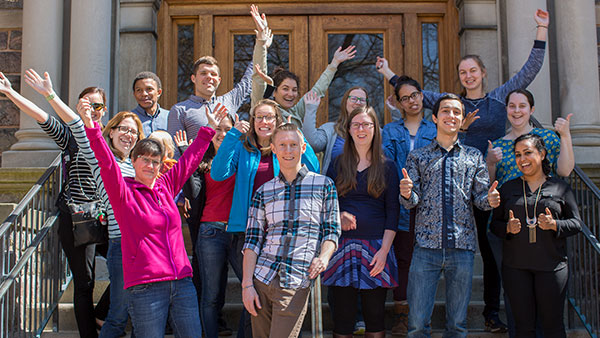“Removing barriers of time and space, designing inclusive onramps, and creating flexible stackable learning models are essential to increasing access to higher education.” - James DeVaney
Online & Hybrid Programs
Meeting the needs of a diverse population of lifelong learners
We work with academic units to remove barriers of access to exceptional U-M learning experiences and to consider new approaches to engaging with learners at different stages of life and career.
Portfolios: create, bundle, and rebundle to get more from your efforts
We encourage academic units to strategically rebundle content to create online program portfolios. The portfolio approach combines degree programs with open learning experiences—such as open online courses, a MicroMasters program, or a MasterTrack certificate—to create a variety of pathways for learners to engage as part of the Michigan community.
Online program portfolios
- provide innovative learning experiences of various durations, commitment level, and depth of study
- offers high quality learning experiences that promote multidisciplinary problem solving and diversity, equity and inclusion
- are affordable, accessible at scale, and available for global and lifelong learners
From on-ramps to online degrees and beyond
The degree program portfolio allows a program to meet their prospects, students, alumni, and worldwide audience wherever they may be needed–whether they want to gain confidence or confirm their interest before committing to a full degree program, or whether they want to extend their knowledge and skills beyond the degree programs.
Online degree portfolios help Michigan students become—and remain—leaders in their disciplines, regardless of where they are


We support academic units in all aspects of the design and development of exemplary online and hybrid degree programs.
Online and hybrid degree programs:
- extend access to U-M’s outstanding learning experiences
- reduce geographic and temporal barriers
- offer rigorous, high quality, and innovative degree courses and complementary co-curricular experiences
- encourage connections to the University and to other U-M students, including opportunities for informal learning
- take on a wide variety of curricular designs, employing state of the art technology to engage students in learning activities
Hybrid programs leverage both on-campus and online learning experiences, which may be most appropriate to create ideal interactions for particular disciplines.
Open online courses and MicroMasters and MasterTrack certificate programs allow learners to enroll without completing an application.
Open Online Courses
Degree content can be quickly and easily rebundled into an open online course. This stackability allows learners to engage in a more flexible, lower stakes learning experience, while still allowing successfully completed tasks to count toward required elements of degree courses.
Benefits of rebundling:
- broadens the learner population
- lets users sample a portion of the content to build confidence that a particular degree program is the right path to pursue
- allows learners to apply open course work toward work required in degree courses
MicroMasters and MasterTrack Certificates
Certain credentials offer a flexible but rigorous open enrollment pathway to help learners begin their graduate studies: a MicroMasters (on edX) and a MasterTrack Certificate (on Coursera). Certificate courses complement the degree curriculum and are often comprised of material drawn from the degree program’s courses.
Learners:
- enroll without having to complete an application
- have more flexible start and end dates than with a traditional degree program
- may apply to the associated degree program upon successful completion of a certificate program and, if admitted, certificate work can be applied to credits associated with specific degree program requirements.
Propose a Program
Our Academic Innovation Fund (AIF) supports the development of online and hybrid degree program portfolios. Academic units are required to submit a proposal to be considered for partnership.
We encourage academic units to contact us early in the design process.
As academic units explore offering new online and hybrid academic programming, there is tremendous value in bringing individuals who support development and launch of these programs together to share practices and find opportunities for ongoing connections.
To connect with peers to identify and share specific challenges your academic unit is facing on the path to launching an online or hybrid program, read more about Learning Communities
New or modified online and hybrid program proposals must be approved as part of the Office of the Provost’s degree approval process to ensure they meet regulatory and compliance requirements that apply to distance education programs.
To create a culture of compliance that supports innovation at the University, we offer preliminary compliance consultations for all OHPs, whether or not you work with us to develop the program.
If you’re interested,
- Complete a questionnaire.
- Request a consultation.
Program Development Resources
The following resources are available to assist academic units and staff who are designing and developing online and hybrid program portfolios.
The Playbook
Academic Innovation has created and will continue to maintain an OHP Playbook to serve as a comprehensive resource for academic units as they develop OHPs. In addition to outlining the program approval process for OHPs, it highlights key compliance requirements and common issues that are triggered by distance learning activities.
Distance education disclosures page
Academic Innovation maintains a Distance Education Disclosures page that contains institutional policies and federally required notices that impact online students. Namely, this page includes statements concerning state authorization, licensure, data privacy and protection policies, important considerations for international students, and related subjects. Academic units are encouraged to link to this page from program description or FAQ pages.
Vendor partnerships
Academic Innovation is partnering with external vendors to provide critical services relevant to the development of online and hybrid program portfolios. Academic units interested in exploring services provided by one of our vendor partners should contact us to learn more.
The following service providers have established Master Services Agreements with the University through RFPs sponsored by the Center for Academic Innovation:
- Market analysis and feasibility research services: Burning Glass, Eduventures Research
- Proctoring services: Examity and ProctorU
- Instructional/learning experience design services: iDesign, Inno-versity, Wiley
The following resources are for units who are designing and developing online and hybrid program portfolios.
The Playbook
Our OHP Playbook outlines the program approval process, key compliance requirements, and common issues that are triggered by distance learning activities.
Distance education disclosures page
Our Distance Education Disclosures page contains institutional policies and federally required notices that impact online students. This page includes statements concerning state authorization, licensure, data privacy and protection policies, important considerations for international students, and related subjects. Academic units are encouraged to link to this page from program description or FAQ pages.
Vendor partnerships
We partner with external vendors to provide critical services for our online and hybrid program portfolios. The following have established Master Services Agreements with us:
- Instructional/learning experience design services: iDesign, Inno-versity, Wiley
- Proctoring services: Examity and ProctorU
- Notice for Canvas Users: ProctorU is the only service integrated into Canvas at this time
- Information regarding establishing protoring service for an academic unit
- Market analysis and feasibility research services: Burning Glass, Eduventures Research
Contact us to learn more.